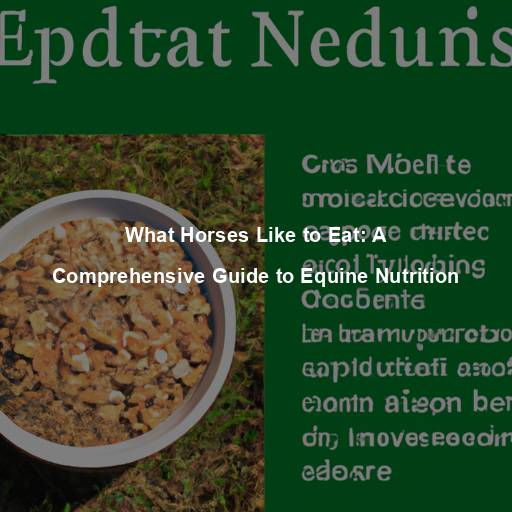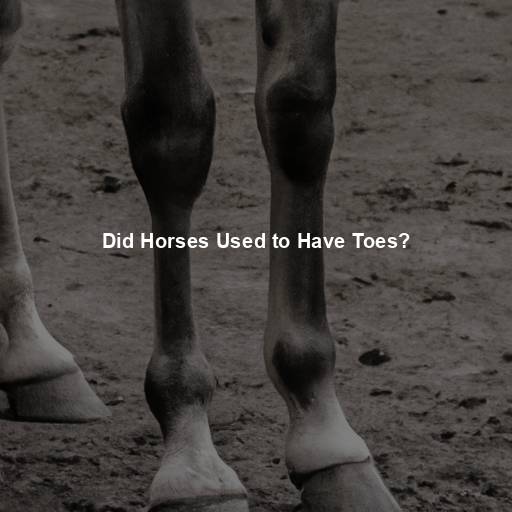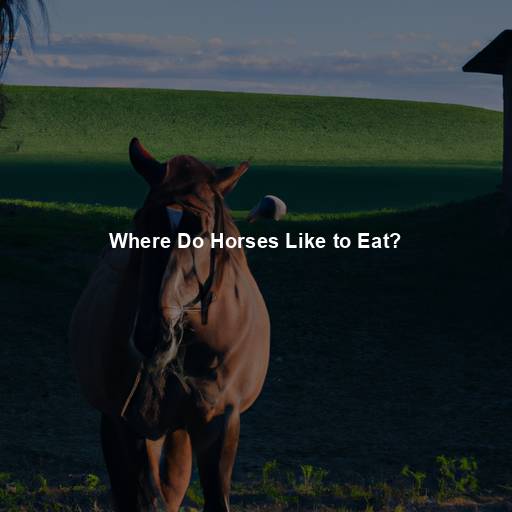What Horses Like to Eat: A Comprehensive Guide to Equine Nutrition
Last Updated on November 8, 2023 by Evan
Contents
- 1 Understanding the Dietary Needs of Horses
- 1.1 The Herbivorous Nature of Horses
- 1.2 The Importance of Forage in a Horse’s Diet
- 1.3 Types of Forage for Horses
- 1.4 Balancing a Horse’s Diet with Concentrates
- 1.5 Understanding Nutritional Requirements
- 1.6 Feeding Considerations and Best Practices
- 1.7 Understanding the Purpose of Supplements
- 1.8 Making Informed Supplement Choices
- 2 FAQs – What Horses Like to Eat
- 2.1 What is the natural diet of a horse?
- 2.2 How much forage should I provide for my horse?
- 2.3 Can horses eat fruits and vegetables?
- 2.4 Is it okay to feed horses grains and concentrates?
- 2.5 Can horses eat haylage or silage?
- 2.6 Should I provide mineral supplements to my horse?
- 2.7 Are there any foods that horses should avoid?
- 2.8 How often should I feed my horse?
- 2.9 Can horses have salt in their diet?
- 2.10 What should I do if my horse has specific dietary needs?
Understanding the Dietary Needs of Horses
In the realm of all things equine, there exists a mesmerizing creature that embodies strength, grace, and a captivating beauty beyond compare – the horse. As keepers of these majestic beings, it is our boundless duty to unravel the enigma that is their nutritional needs. Their diet holds the key to their very essence – their health, their prowess, their innermost fulfillment. Prepare to embark on a lyrical expedition into the realm of equine nutrition, where the secrets of what these regal creatures savor and the importance of catering to their diverse palates will be unveiled.
The Herbivorous Nature of Horses
Did you know that horses have quite the intriguing diet? These magnificent creatures are true herbivores, munching away on plant material to fuel their daily adventures. But here’s where things get really interesting: their digestive system is a fascinating marvel. With a unique structure that includes a sizable cecum and a process called hindgut fermentation, horses have mastered the art of extracting all the necessary nutrients from fibrous plant matter like grasses and hay.
The Importance of Forage in a Horse’s Diet
Discover the age-old secret to equine vitality – the alluring world of forage. Picture a picturesque pasture, lush with high-fiber wonders awaiting your majestic steed’s gentle nibbles. Timelessly captivating, this foraging behavior is deeply ingrained in their wild ancestry, providing holistic nourishment for both body and mind. Unlock the power of quality forage, as it weaves a tapestry of digestive wellness and untamed contentment in the enigmatic realm of horses.
Discover the captivating world of gut health and the astounding benefits of incorporating forage into your daily routine. Immerse yourself in the intricate workings of your digestive system, as this natural wonder stimulates saliva production and maintains the ideal pH balance. Brace yourself for a mind-boggling revelation as you learn how forage becomes your ultimate ally in combating colic and gastric ulcers, ensuring a harmonious gut environment.
- Dental Health: Chewing on fibrous forage helps wear down a horse’s teeth naturally, preventing dental issues that can hinder their ability to eat and process food effectively.
There’s something incredibly satisfying about watching horses roam freely, indulging in their innate desire to graze on lush forage. Not only does this behavior fulfill their instinctual needs, but it also works wonders in terms of reducing their stress levels and warding off any hint of boredom. There’s a certain enchantment in witnessing these magnificent creatures engage in such simple yet profound acts, creating a sense of contentment and harmony that’s truly magical.
Types of Forage for Horses
When it comes to feeding our equine friends, there is a wonderful array of forages available, each providing distinct and valuable nutritional properties. Join us as we embark on a journey to discover the plethora of options that exist to keep our horses happy and healthy. From grasses to legumes, hay to pasture, the world of forage is a fascinating and complex realm that never ceases to amaze and perplex. Prepare to be enlightened as we delve into the wonderment of equine sustenance!
Grass, oh splendid grass! It possesses such a tantalizing allure for graceful horses, offering them a cornucopia of nutrition. Within its verdant blades, lie a treasure trove of essential vitamins, minerals, and life-sustaining energy. Yet, let us not be deceived by its deceptive simplicity, for the nutritional bounty it bestows upon our equine companions is subject to the capricious fluctuations of seasons, soil quality, and the whims of various plant species.
Hay: A fundamental component of equine sustenance, hay serves as a reliable and nourishing substitute for fresh pasture during periods of scarcity. This age-old practice involves the harvesting and preservation of dried grass or legume forage, offering horses a consistent and essential source of nutrients year-round. Among the diverse array of hay varieties available, timothy, orchard grass, alfalfa, and clover stand out as popular choices for equestrian enthusiasts. Embracing hay in equine diets guarantees a sense of stability while fortifying the bond between horse and caretaker.
Galloping gracefully across the lush meadows, horses find solace in the art of grazing on pasture. This enchanting practice not only rewards them with a burst of invigorating exercise but also tantalizes their curious minds, offering a cornucopia of flavors and textures to explore. Yet, amidst this bewitching tapestry lies the perplexing challenge of managing the pasture wisely, walking the fine line between allowing abundant forage to thrive while safeguarding against the dire consequences of overgrazing.
Balancing a Horse’s Diet with Concentrates
For the well-being of our equine companions, it is crucial to acknowledge that forage alone may not always fulfill their complete nutritional needs. Enter concentrates: these specialized supplements serve as a vital source of essential nutrients that may be deficient in forage. With smaller portions and a range of options available, concentrates offer a thoughtful solution to bridge any nutritional gaps, ensuring our horses thrive with a well-rounded diet.
- Grains: Common grains fed to horses include oats, barley, and corn. These grains are rich in carbohydrates and can provide a source of energy. However, they should be fed in moderation and balanced with other nutrients to prevent issues like obesity and metabolic disorders.
When it comes to nourishing our equine friends, commercial feeds step into the spotlight. These carefully crafted blends, be it in the form of pellets or extruded feeds, bear the burden of providing a well-rounded nutritional regime tailored specifically for horses. A symphony of grains, vitamins, minerals, and additives dances within these feeds, harmoniously striving to enhance the overall well-being and performance of our majestic companions. Experience the bewildering world of commercial feeds as their enigmatic blends unlock the mysteries of equine nutrition.
Understanding Nutritional Requirements
Navigating the labyrinth of equine nutrition can leave even the most seasoned horse owner feeling perplexed. With a myriad of factors such as age, breed, body condition, activity level, and health concerns all swirling in a complex dance, finding the perfect dietary balance for your horse can feel like searching for a needle in a haystack. Thankfully, seeking guidance from a trusted veterinarian or equine nutritionist can provide invaluable insight and help unravel the mysteries of your horse’s unique nutritional needs. Ultimately, ensuring the well-being of your beloved equine companion lies in understanding and embracing the power of personalized nutrition.
When putting together a horse’s diet, it is important to take into account a range of vital nutrients that play a pivotal role in their overall well-being. These essential components include proteins, carbohydrates, fats, vitamins, and minerals, which work together in a complex harmony to support the horse’s optimal health. By carefully considering and balancing these nutritional building blocks, one can ensure that their equine companion receives the nourishment they need for sustained energy, proper growth, and robust vitality.
Protein: When it comes to our equine friends, they rely on protein to fuel their impressive muscle growth, mend their delicate tissues, and carry out a myriad of essential metabolic tasks. For that extra boost, turn to the mighty legumes like alfalfa or clover, and don’t forget about the power-packed grains. Fueling their bodies with the right protein sources ensures these majestic creatures can gallop ahead with vigor and vitality.
-
Vitamins and Minerals: Horses need a range of vitamins and minerals to support overall health and well-being. These include vitamin A, vitamin E, calcium, phosphorus, and selenium. Adequate levels of these nutrients can be obtained through a balanced diet or through targeted supplementation.
-
Water: While not a nutrient, water is a vital component of a horse’s diet. Clean, fresh water should be available to horses at all times, as dehydration can lead to serious health issues.
Feeding Considerations and Best Practices
When feeding horses, it is crucial to follow some best practices to ensure their nutritional needs are met and to prevent any potential problems:
When it comes to feeding your animals, the importance of selecting top-notch forage and concentrates cannot be overstated. Opting for high-quality options that are free from any lingering mold, dust, or other contaminants is the first step in ensuring optimal health and digestion. Don’t underestimate the impact that poor-quality feed can have on your beloved animals’ overall well-being; make their nutrition a top priority to avoid any potential health concerns.
- Feed Frequency: Horses have small stomachs and a continuous digestive process. Therefore, they should be fed smaller meals more frequently throughout the day, mimicking their natural grazing behavior.
Keeping a keen eye on your equine companion’s physique is paramount. In order to ascertain whether they are in optimal health, periodically appraising their bodily condition is vital. Should you detect any fluctuations, take prompt action to regulate their sustenance with precision, thus deterring both surfeit and deprivation.
As equestrians, we understand the importance of keeping our beloved horses happy and healthy. When it comes to their diet, it’s crucial to introduce changes gradually. The delicate balance of a horse’s digestive system can easily be disrupted by sudden shifts in their feeding routine. To avoid any potential digestive upset or, even worse, colic, take the time to acclimate your horse to new feeds or dietary modifications slowly.
When it comes to nourishing our beloved horses, we often find ourselves questioning the role of supplements in their overall nutrition. The intricacies of equine digestion and metabolism add a layer of perplexity to an already complex subject. While forage remains the backbone of their diet, there are instances where supplements play a crucial role in filling nutritional gaps and promoting optimal health. Consulting with experts and considering individual needs are vital steps in navigating the burstiness of equine nutrition and ensuring our equine companions receive the best possible care.
Understanding the Purpose of Supplements
In the realm of equine nutrition, supplements have managed to carve a niche for themselves in addressing the intricate nutritional needs and peculiar health concerns of our magnificent horses. Although a wholesome and balanced diet strives to fulfill most nutrient requirements, there arise perplexing situations that demand the inclusion of extra supplementation. Delving further into the enigmatic world of equine nutrition, let us explore the diverse array of supplements that have emerged as recurrent favorites in the equestrian domain.
Vitamin and Mineral Supplements
When it comes to supporting a horse’s nutritional needs, vitamin and mineral supplements can play a crucial role. By targeting specific nutrient deficiencies, they aim to bridge the gap between what a horse’s diet may lack and what it needs to thrive. Whether it’s due to subpar forage quality or heightened nutritional demands like growth, pregnancy, or rigorous training, these supplements can provide a valuable boost. However, it’s essential to approach supplementation with caution, as an overabundance of vitamins and minerals might do more harm than good.
Joint Supplements
Joint health is a significant concern for many horse owners, particularly in older horses or those engaged in strenuous activities. Joint supplements typically contain ingredients such as glucosamine, chondroitin sulfate, and hyaluronic acid, which are believed to support joint function and reduce inflammation. While some studies suggest potential benefits, the effectiveness of joint supplements varies among individual horses, and results may not be universally consistent.
Digestive Health Supplements
Ensuring optimal digestive health in equine companions is no trifling matter. Horses, with their delicate constitution, are no strangers to tumultuous tummy troubles like colic and those wily gastric ulcers. That’s why the market is flush with an assortment of digestive health supplements, brimming with probiotics, prebiotics, and digestive enzymes. Their noble mission?
Omega-3 Fatty Acid Supplements
Over the past years, there has been an escalating interest in the enchanting world of omega-3 fatty acids, gracefully exemplified by the mesmerizing presence of fish oil and flaxseed oil. Crowds have flocked to these supplements, whispering in awe about their mystical anti-inflammatory properties and their rumored ability to transform one’s well-being. Some even claim that these supplements hold the secret to unlocking the elusive balance in joint function, the ethereal glow of flawless skin and coat, and the impervious shield of an invigorated immune system. Yet, amidst the enchantment, a cloud of uncertainty remains, as these claims require more research to reveal the full extent of their power and to establish the perfect dosage for these captivating omega-3 fatty acid supplements.
Making Informed Supplement Choices
When it comes to enhancing your horse’s well-being through supplements, careful deliberation and well-informed decisions are vital. To help guide you in this perplexing realm, here are some crucial factors to bear in mind. By embracing a cautious approach and considering these key aspects, you can navigate the bewildering world of equine supplementation with greater confidence and clarity.
Consult with Professionals
Before adding any supplements to your horse’s diet, consult with a veterinarian or equine nutritionist. They can evaluate your horse’s specific needs, assess the quality of your current feeding program, and provide guidance on whether supplementation is necessary.
Quality and Safety
Choose supplements from reputable manufacturers that follow quality control standards and have a track record of producing safe and effective products. Look for supplements that have been tested for purity, potency, and quality assurance.
Research and Evidence
While anecdotal evidence and personal testimonials can be persuasive, it is important to rely on scientific research and evidence-based information when considering supplementation. Look for studies conducted on horses or other large animals, as results from small animal studies may not necessarily translate to equine nutrition.
Proper Dosage and Administration
Follow the recommended dosage instructions provided by the supplement manufacturer. Avoid over-supplementing, as excessive amounts of certain nutrients can be harmful to horses. Administer the supplements as directed and monitor your horse for any adverse reactions or effects.
FAQs – What Horses Like to Eat
What is the natural diet of a horse?
Heralded for their equine elegance and revered for their vegetarian tendencies, horses gallantly embrace their herbivorous heritage. Naturally nurturing their appetites with a verdant menu, they delight in the delectable offerings of luscious grasses, fragrant herbs, and captivating leaves. Like nomads of nature, these majestic creatures effortlessly traverse the wild, devoting abundant hours to leisurely foraging upon an array of tantalizing grasses and captivating flora.
How much forage should I provide for my horse?
When it comes to taking care of our equine companions, ensuring they receive an optimal amount of forage is of utmost importance. Experts suggest that horses should consume about 1.5 to 2% of their body weight in forage daily, be it through grazing on lush pasture or feasting on top-notch hay. This not only promotes their overall well-being but also plays a crucial role in maintaining a robust digestive system. So, make sure your four-legged friend gets their fair share of the forage feast!
Can horses eat fruits and vegetables?
Horses, being the majestic creatures they are, can indulge in an array of delectable fruits and vegetables. With cautiousness and an observant eye, one can seamlessly integrate these treats or supplementary delights into their horse’s daily menu. An assortment of scrumptious options awaits, from the crunchy sweetness of carrots and apples to the succulent delights of watermelon and pumpkin. So, embark on this culinary journey with your equine companion and relish the bewildering carousel of flavors!
Is it okay to feed horses grains and concentrates?
Grains and concentrates can be included in a horse’s diet, but they should be fed in moderation. These feed types are typically used to provide additional energy for horses with high activity levels or specific dietary needs. It is important to consult with a veterinarian or equine nutritionist to determine the appropriate amount and type of grains to include in your horse’s diet.
Can horses eat haylage or silage?
Haylage and silage are often used as alternative forms of forage for horses. However, it is crucial to select high-quality haylage or silage that is safe for equine consumption. Improperly fermented or moldy haylage/silage can pose health risks to horses. Ensure that you source these products from reputable suppliers and examine the quality before feeding them to your horse.
Should I provide mineral supplements to my horse?
Understanding the nutritional needs of horses can be quite perplexing, with factors such as diet, age, and overall health all playing a role in determining whether mineral supplements are necessary. While horses that have access to quality pasture or a well-balanced diet may not require additional supplementation, it is always best to seek the guidance of a trusted equine nutritionist or veterinarian. They can help unravel the mysteries surrounding your horse’s specific needs and advise on whether mineral supplementation is necessary for optimal health.
Are there any foods that horses should avoid?
When it comes to the well-being of our equine friends, it’s crucial to be mindful of what we feed them. It might come as a surprise, but certain foods can be downright harmful to horses. Avocados, chocolate, onions, garlic, caffeine, alcohol, and anything containing xylitol should be strictly off-limits. Equally important is avoiding moldy or spoiled food, as it could wreak havoc on their digestive system and jeopardize their overall health.
How often should I feed my horse?
Horses generally require frequent feeding to maintain a healthy digestive system. It is recommended to feed horses smaller meals multiple times a day, simulating their natural grazing behavior. Most horses thrive on a feeding schedule of two to three meals per day, with constant access to fresh water and forage.
Can horses have salt in their diet?
Ensuring a balanced electrolyte equilibrium and prompting hydration are essential for a horse’s well-being, making salt a valuable addition to their nutrition. Utilizing a salt block or integrating salt into their grain are popular methods to guarantee an ample sodium supply. However, the delicate balance lies in avoiding excessive salt intake, striking a fine line between equine hydration and potential dehydration risks.
What should I do if my horse has specific dietary needs?
When it comes to our noble steeds, it’s imperative that we give them the care they truly deserve. If your four-legged companion has unique dietary needs or health issues, don’t hesitate to reach out to a veterinarian or equine nutritionist for some much-needed guidance. These experts will tailor a customized diet plan based on your horse’s specific requirements, taking into account various factors like age, activity level, pre-existing health conditions, and the feed options available to you. Prioritizing their sage advice will undoubtedly guarantee your horse’s unwavering health and overall well-being.






